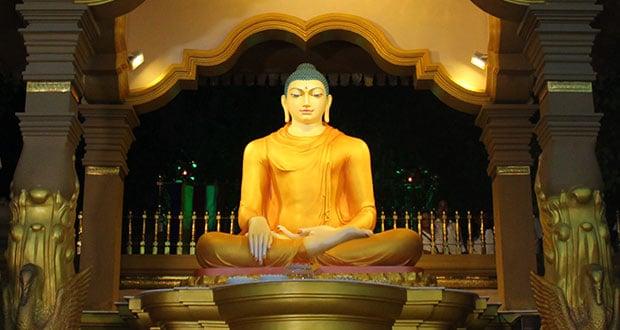History of mankind bears ample testimony to man’s manifold attempts to conquer the mind through diverse religious practices, rights and rituals. Yet many a sages fell victim to the inherently deceptive nature of the mind, falling short of the ultimate goal of liberation; the end of suffering and the woeful cycle of rebirth.
Nevertheless, Supreme Buddha our great teacher with his unparalleled intellectual prowess and unsurpassed wisdom fully comprehended the illusive nature of the mind and attained enlightenment.
Our predicament
Conquering one’s mind, by cleansing the age-old defilements and unskillful habits fostered over innumerable lifetimes, in our samsaric journey, is a tedious process requiring great skill, patience and wisdom. The major stumbling block in this process is our self-view, which tricks us to believe that we are in control of our mind. The command the mind has over us is explicitly stated in the following verses found in the Devata samyutta in Samyutta Nikaya.
Deity: “By what is the world led around?
By what is it dragged here and there?
What is the one thing that has all under its control?
Supreme Buddha: “The world is led around by mind;
By mind it’s dragged here and there
Mind is the one thing that has all under its control.
Hence, although it’s a bitter pill to swallow, we have to come to terms with the fact that we have long since being enslaved by our defiled mind. This is why Supreme Buddha advised us to reflect upon our minds thus: “For a long time this mind has been defiled by greed, hatred and delusion. “Contemplating in this manner compels us to be heedful in practicing Dhamma.
What makes mastering the mind a tall order is its extremely complex nature. The mind is diverse, deceptive, fickle, and crafty, and much more than words could ever describe.
The diverse mind
On one occasion Supreme Buddha emphasized the extreme biodiversity of the animal realm as a classic reflection of the diverse nature of the mind. The point here is the diversity of the creatures in the animal realm reflects the diversity of their past kamma, which has led to rebirth in the animal realm. This diversity of kamma has its origin in the diversity of volition (cetana), a mental factor. Furthermore, the blessed One mentioned He does not see any other class of living beings as diverse as those in the animal realm, yet the mind is more diverse than those beings in the animal realm.
The volatile mind
Our mind is also prone to mercurial mood swings. The most trivial of matters in life suchlike a furtive glance, a frivolous remark, hold up in the traffic or a spot of bad weather is sufficient to unsettle our minds. This is why our mind is obsessed in face of the eight worldly conditions; gain and loss, fame and disrepute, blame and praise, pleasure and pain. We are attracted to gain and repelled by loss, likewise we try to cling on to the positive aspects of the eight worldly conditions and fend off the negative. Supreme Buddha likened this nature of the mind to a fish that pulsates and trembles when pulled out of the water and thrown on land.
The monkey mind
The average mind is a madhouse of activity. With torrents of data flowing in from the senses in constant flux and flow, the mind is caught up in a whirling vortex of emotions. The end result is ceaseless change or impermanence. Reflecting upon this state of impermanence Supreme Buddha said, just as a monkey roaming through a forest grabs hold of one branch, lets that go and grabs another, then lets that go and grabs still another, so too that which is called ‘mind’ and ‘mentality’ and ‘consciousness’ arises as one thing and ceases as another by day and by night. Here the figurative expression “Day and night” signify the continued change or impermanence of the mind.
The fickle mind
Another distinctive characteristic of the mind is its notoriously fickle nature. This is why many of us find it hard to give up our bad habits such as smoking, getting drunk, gambling, womanizing, etc. Even if we succeed in suppressing these urges for a short period, more often than not the fickle mind tricks us into committing the same transgressions again and again.
The luminous mind
Let us look into some of the teachings of the Blessed One for guidance in taming the monkey mind. According to Supreme Buddha, our mind is intrinsically luminous, yet it is defiled by adventitious defilements. By practicing the noble eightfold path composing of morality, concentration and wisdom, we can gradually cleanse the mind of defilements, allowing the luminosity of the mind to surface, restoring the mind to its original state. It is the luminous mind that can be directed to gain the knowledge and vision of liberation. Therefore restraining the sense faculties is of prime importance in preventing the mind from been sullied due to exposure to various sensory perception. The following exchange between Supreme Buddha and a deity in the Devata samyutta gives us a hint of invaluable advice as to how this task should be undertaken.
Deity: “From whatever one reins in the mind,
From that no suffering comes to one.
Should one rein in the mind from everything,
One is freed from all suffering.”
Supreme Buddha: “One need not rein in the mind from everything
When the mind has come under control
From whatever it is that evil comes,
From this one should rein in the mind.”
A common misconception
Ironically, most western practitioners of late, hold the same view as the deity; reining in the mind from all mental phenomena, the concept of ‘letting go’ of all sensory perception and reaching a state of ’emptiness’; misconstrued as deliverance from suffering. At best this method can only lead to rebirth in the non-percipient sphere.
In contrast blessed one points out, instead of reining in the mind from all mental phenomena, it should only be reined in from what is unwholesome. That is to say sensory perceptions conducive to the purification of the mind are to be pursued and allowed whilst the in-conducive are abandoned and averted.
Mind your mind
This is a process that requires constant mindfulness. As per the teachings of Supreme Buddha the five faculties (eye, ear, nose, tongue and body) take recourse in the mind and the mind in turn takes recourse in mindfulness. The following simile by Supreme Buddha exemplifies the necessity of mindfulness in purifying the mind. Just as a wise and competent gatekeeper of a king’s frontier fortress keeps out strangers and admits acquaintances, protecting its inhabitants from potential enemies, so too the noble disciple with mindfulness as his gatekeeper stands on guard at the sense faculties and abandons the unwholesome and develops the wholesome, purifying his mind.
The six animals
In another beautiful simile Supreme Buddha clearly explained the relationship between mindfulness and restraint of the senses. Six animals, a snake, a crocodile, a bird, a dog, a jackal and a monkey are leashed together with six ropes knotted in the middle. Since these animals have different habitats and different feeding grounds each tries to run to its own habitat and feeding ground. The snake pulls towards an anthill, the crocodile towards the water, the bird towards the sky, the dog towards the village, the jackal towards the charnel ground and the monkey pulls towards the forest. Because the animals are tied together and pulling towards different directions eventually they are exhausted. Then they would be dominated by the strongest among them, submit to it and come under its control. Likewise the bhikkhu who is not mindful will be assailed by stimulants of the six senses; forms, sounds, odours, tastes, tangibles, and mental phenomena. Therefore the six senses have to be reined in with mindfulness. Just as if the six animals are tied to a post or pillar. Then as before, when each animal pull towards their own habitat and feeding ground they will be exhausted and forced to, either stand close to the post or else sit or lie by the post. Likewise the bhikkhu that dwells with mindfulness directed to the body shall not be assailed by the six senses. In this simile Supreme Buddha likened body-mindfulness to a strong post or a pillar and encouraged his disciples to develop and cultivate mindfulness.
Developing the mind towards deliverance
Practicing mindfulness is conducive to restraint of the senses and vice versa. These two aspects of the training go hand in hand. Sense-restraint protects the mind from further defilement. Moreover it deprives the hindrances (sensual desire, ill will, sloth and torpor, restlessness and remorse, and doubt) of their source of strength and nourishment. Thus with the hindrances weak and subdued, meditation is much easier. Practicing serenity meditation develops the mind whilst insight meditation develops wisdom. When the concentrated mind reaches higher mental absorptions, the mind becomes purified, malleable, and wieldy. The mind can then be directed to destruction of the taints, gaining the knowledge and vision of liberation, culminating in Nibbana; deliverance from suffering.
The tamed mind
Therefore as pious disciples of Supreme Buddha we too should aspire to achieve the lofty goal of Nibbana by taming our monkey mind. If we persistently cultivate and enrich our confidence in Supreme Buddha, the profound Dhamma and the Noble Sangha this is an objective well within our reach.
Having tamed his monkey mind Arahant Valliya chanted the following verses,
”In a shelter with five doors there lives a monkey.
Time after time the monkey peeks out of each door,
and makes contact with the world outside.”
”Hey monkey, stand still, do not run. Your shelter is not the same as before.
With the senses restrained, you’ve been disparaged with intuitive wisdom.
You shall never again wander in samsara.”
Supreme Buddha the first to comprehend the fathomless mystery of the mind, said the following,
”Bhikkhus, I do not see even one other thing that when untamed leads to such great harm as the mind. An untamed mind leads to great harm.”
”Bhikkhus, I do not see even one other thing that when tamed leads to such great good as the mind. A tamed mind leads to great good.”
The untamed mind is your worst enemy. The tamed mind is your best friend. That being so, tame your monkey mind, cage it and be free!














Recent Comments